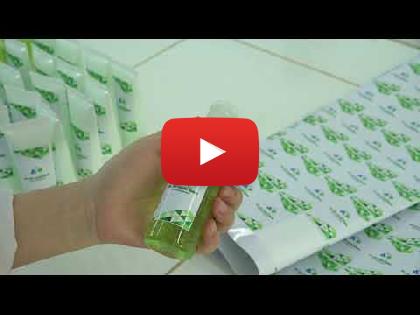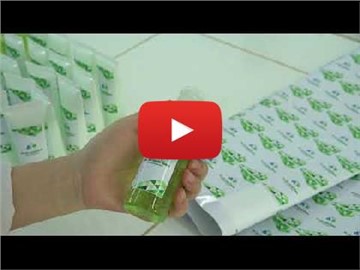
Contents Provided by Media OutReach
HANOI, VIETNAM - Media OutReach - 2 April 2021 - Students and scientists at the Viet Nam National University Ho Chi Minh City (VNUHCM) have carried out extensive research and developed products that help prevent the spread of COVID-19.
Out of 2,000 projects from 79 countries, one on producing protein from Ecoli bacteria in laboratories by a student team from the University of Science won sponsorship from the Agence Universitaire de La Francophonie - a society of universities offering training in the French language.
Firstly, they collaborated with a company in the bio-technology industry to carry out the project under Dr. Nguyen Thuy Vy, head of the genetics department at the university's biology and bio-technology faculty. The research was prompted by the fact that asymptomatic COVID patients and those with mild symptoms were believed to be a hurdle to control the pandemic in the community.
To detect infection, many countries use antibody tests. The advantages of this method are that it is fast, easy to deploy on a large scale and has great accuracy. However, Viet Nam does not have suppliers of SARS‐CoV‐2 viral protein antigens, making it difficult for companies to seek for manufacturing antibody testing kits. Dr Nguyen Thuy Vy said: "We use a technology to produce protein from Ecoli bacteria at low cost. Around the world, most proteins are produced from animal tissue." Vy and two students, Le Tran Dang Khoi and Vo Ho My Phuc began the research in early June with sponsorship from AUF and they created products within three months.
"The project does not only contribute to COVID-19 prevention but also inspires other students to take up research. The product is useful for COVID-19 tests with fast, accurate results and affordable prices."
The VNUHCM's National Key Laboratory of Digital Control and System Engineering (DCSELab) collaborated with the Centre of Science and Technology Development for Youth to make a mobile disinfection chamber. With sensors detecting and automatically spraying once a person steps in, signal lights, and a 360-degree fog mist sprayer, the chamber uses anolyte solution and ultraviolet, ozone and heat disinfection technologies to help disinfect the whole body. The chamber has been used at several hospitals in the city since the COVID-19 pandemic broke out.
DCSELab's scientists also made an automatic chamber for disinfection and obtaining samples from patients without making contact. The chamber disinfects automatically before the next person enters for giving samples. Though ultraviolet disinfection technology is used, the UV rays do not directly touch peoples' bodies and so are not harmful to health officials or patients. Moreover, the high-efficiency particulate air filter technology combines with UV to completely kill viruses and bacteria remaining in the air after being sucked out of the chamber.
The other COVID-19 product by DCSELab is a simple ventilator working on the principle of automatically squeezing and releasing Ambu bag to deliver air into a patient's lungs. The product is being finalized after many revisions and consultancy from specialists at Cho Ray Hospital and the University of Medicine and Pharmacy.
Another VNUHCM's member university, the University of Technology, has innovated dozens of useful and convenient products to serve the community in terms of COVID-19 prevention and containment.
Scientists at the Bach Khoa Research Centre for Manufacturing Engineering at the University of Technology have also made a mobile disinfection system with air filters to ensure clean air is discharged in the environment. The technology has been transferred to companies for commercialisation and mass production.
A research team at the University of Technology's material technology faculty has made masks that could be used by healthcare workers for continuous hours.
Assoc. Prof. Dr. Huynh Dai Phu, the faculty dean, said when COVID-19 broke out, one urgent issue was a shortage of medical equipment. Healthcare workers faced a high risk of infection because of working for many hours in an environment without negative pressure chamber. It was very important for them to use preventive clothes, goggles and masks to prevent the risk of contracting the virus, and his team made these masks with a bacteria and air filter membrane to avoid infection, Phu said.
The air supplied through the mask is sufficient for many hours for healthcare workers. This mask mitigated some of the shortcomings in existing ones during the pandemic period. In addition, the material used in these masks is environment-friendly polymer. The medical workers at Trung Vuong Hospital are using them.
Lecturers at the University of Technology's mechanical engineering faculty made an automatic machine for sewing masks from anti-bacterial clothing. Besides, the university's lecturers and students made goggles that keep out aerosols from patients using 3D printing technology and sanitizers.
Assoc. Prof. Dr. Mai Thanh Phong, the university's president, said by focusing on products for COVID-19 prevention and control, students, lecturers and researchers at the university hope to contribute their abilities and efforts to the country's combat against the pandemic.
More about VNUHCM
One of VNUHCM's strategies is to continue focusing on scientific and technological development and innovation to help implement national and southern region development strategies and to raise its international profile.
As of October 2020, it had filed 527 applications for patents and 566 technology transfer contracts and scientific services that fetched revenues of VNĐ104.2 billion (US$4,5 million).
In the QS World University Rankings 2021 of 1,527 universities, VNUHCM was in 658th spot in the category of income from technology transfer and 838th in international potential.
VNUHCM was established in 1995 by the Government as one of the country's two national universities to train undergraduates and postgraduates, carry out research, transfer technologies, and lead the higher education system.
Contact:
- (+84-28) 37 242 181 (ext: 1651/1652)
- info@vnuhcm.edu.vn
 Facebook
Facebook





















Latest comments